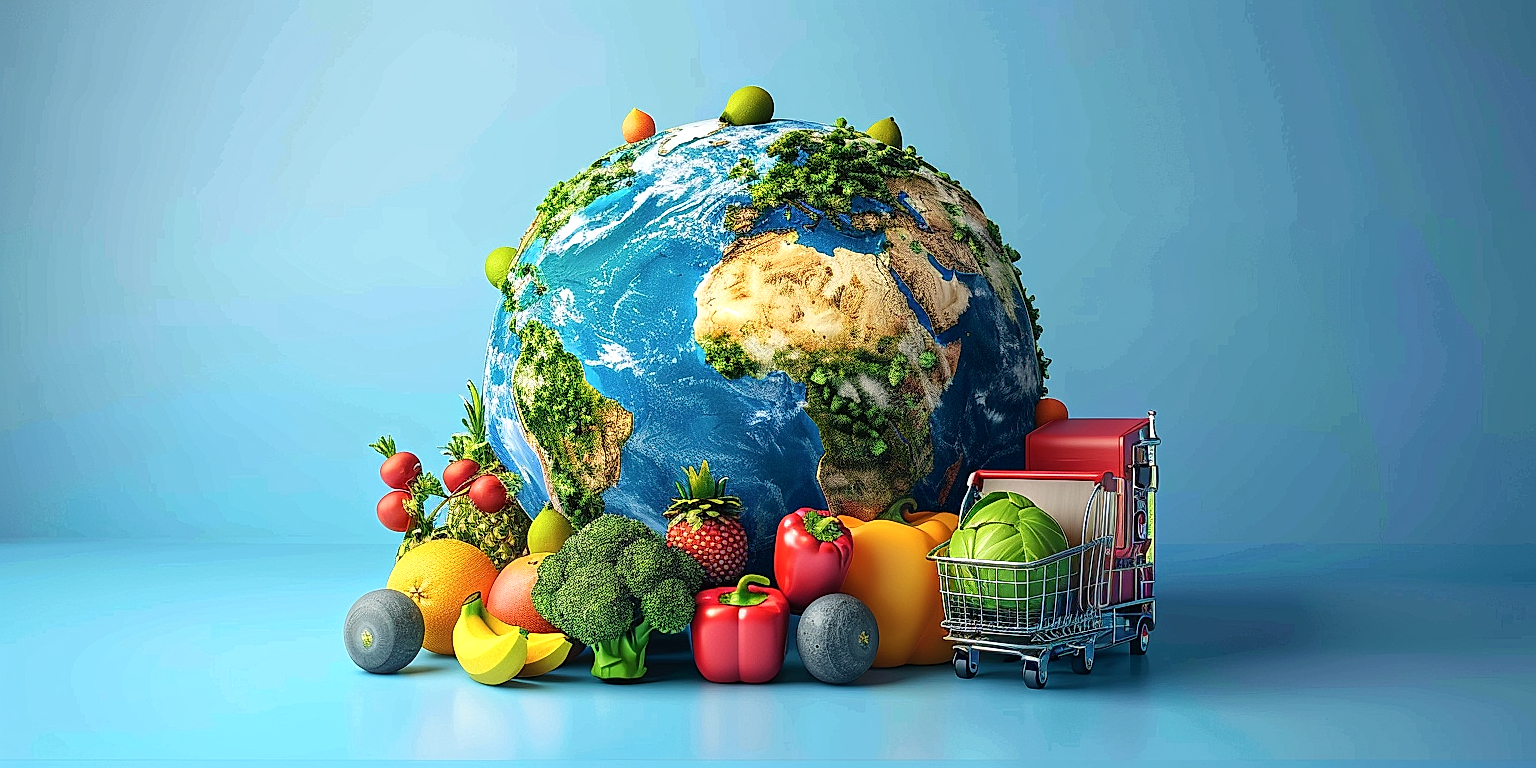With the ever-evolving global trade landscape, understanding and managing tariffs and taxes have become increasingly crucial in the agricultural sector.
Particularly, in the realm of produce shipping, these aspects require careful planning and astute oversight.
Mismanaged duties can have severe implications on operational costs and overall profit margins.
Furthermore, the rules governing these tariffs and taxes are often complex and subject to frequent changes.
This highlights the need for efficient strategies and best practices to effectively administer and deal with these legal responsibilities.
The following insights are aimed to guide those involved in the produce shipping industry in effectively managing their fiscal obligations in an international context.
Contents
- Tips For Managing Tariffs & Taxes In Produce Shipping
- 1. Stay updated with current tariff regulations.
- 2. Understand origin, destination country’s tax system.
- 3. Efficiently Utilize Free Trade Agreements
- 4. Transparently Declare All Shipping Commodities.
- 5. Implement effective inventory management practices.
- 6. Consider hiring a customs broker.
- 7. Ensure Thorough Shipping Documents
- The Bottom Line
Tips For Managing Tariffs & Taxes In Produce Shipping
1. Stay updated with current tariff regulations.
The world of produce shipping is a complex weaving of different tariff and tax regulations.
As an exporter or an importer dealing with international trade, it is mandatory to have a clear and updated understanding of current tariff regulations.
This understanding is pivotal for effectively managing tariffs and taxes to ensure smooth and cost-effective operations.
Understanding the intricate details of tariff regulations allows you to accurately factor in the costs into your pricing strategy, thus creating transparency in your transactions.
It lays an effective groundwork for avoiding any unforeseen complications or costly mistakes arising from ignorance or lack of updated information.
Regularly staying updated with the changes in tariff rules helps minimize the financial risks involved in international trade.
It is essential to remember that the tariff regulations are not static, and they change with changing political climates, trade agreements, and economic policies.
Therefore, it’s not sufficient to gather knowledge about the tariff regulations once and ignore the changes and updates happening over time.
Each country has its unique set of rules and regulations around tariffs and taxes, making it all the more essential to stay updated.
One should also be mindful of the different categories of goods as they may be subjected to different tariffs, especially in the case of perishable goods like produce.
Do not underestimate the importance of educating oneself about other nuanced details, such as access to certain markets, that are also directly impacted by tariffs.
It’s a good practice to frequently check websites of various international trade agencies and organizations that provide updated information about the latest changes in tariff regulations.
A consultation with your freight forwarder can also provide insights into the recent tariffs and how they may affect your business.
Moreover, understanding the potential impacts of possible future changes in the tariffs can help you plan better for those situations.
It might also be beneficial to attend seminars or webinars focused on changes in tariff regulations, as these platforms often provide updated and insightful information that helps in better tariff and tax management.
Hence, staying updated with current tariff regulations is the stepping stone to effective management of tariffs and taxes in produce shipping.
2. Understand origin, destination country’s tax system.
When shipping produce across national borders, its crucial to understand the tax systems of both the origin and the destination countries.
Some countries have more complex tax systems than others. This complexity can result in unexpected costs if not properly understood and considered during the shipping process.
A firm understanding of each country’s tax system is a key step to avoiding any surprise expenses or problems with customs.
Understanding the specific tax system helps you gain actionable insights into what to expect in the entire shipping process.
Having in-depth knowledge about a country’s tax system enables you to plan better, thus minimizing potential tariff and tax complications.
Understanding a country’s tax system allows you to make informed, cost-effective decisions regarding the most efficient transportation method for both fresh and processed produce.
This can mean choosing a method that incurs lower tariffs and less tax liabilities.
Different countries have different taxes, duties, and tariffs imposed on the importation and exportation of goods.
The tax rates vary depending on the type of product, the product’s value, and its quantity.
Other factors, such as standard of packaging, shipping methods, and biosecurity measures can also impact the tax applied to your shipping goods.
The origin country’s tax system is important to consider because it will determine the exportation costs associated with your produce.
Meanwhile, understanding the destination country’s tax system will give you a clear understanding of the importation costs you’ll incur.
This understanding helps you stay ahead of any potential challenges that might arise, such as additional taxes or unexpected customs regulations.
Also, the knowledge of the tax system enables shippers to effectively price their products in the destination market.
Through effective planning and knowledge of these tax systems, you can maximize your profit while ensuring your produce arrives in good condition.
Understanding the origin and destination country’s tax systems enables you to navigate the complexities of international trade and ensure your produce reaches its destination efficiently and effectively.
3. Efficiently Utilize Free Trade Agreements
As one of the ways to manage tariffs and taxes in produce shipping, efficient utilization of Free Trade Agreements (FTAs) is paramount.
FTAs are contracts between two or more countries that are geared towards promoting trade by reducing or eliminating tariff and non-tariff barriers.
These agreements can significantly lower the cost associated with cross-border transactions, hence the need to have an adequate understanding of them.
One of the main benefits of FTAs is that they create a predictable and friendly environment for businesses on both sides of the agreement, which is essential for smooth trading activities.
A deep understanding of the FTA provisions related to your operation can help you derive maximum benefits from the agreement.
Notably, many businesses are unaware of the full extent of benefits offered by these agreements
The benefits in question are not just about reduced tariffs, but also include other aspects such as property rights protection, improvement in market access, and elimination of technical barriers.
For instance, businesses operating within such agreements usually experience less restrictive custom checks, leading to fewer delays at the border control points, hence, speedy shipments.
Also, it becomes easier to resolve trade disputes due to the existence of established dispute settlement mechanisms within the agreements.
Therefore, having comprehensive knowledge of the FTAs that your country has with your destination countries will help you plan better and avoid unnecessary cost or inconveniences.
This knowledge can be achieved through continuous learning and keeping updated with changes in the agreements’ provisions.
Also, taking advantage of training sessions or seminars on the same can be a great step in getting acquainted with these agreements.
To reap maximum benefits from FTAs, businesses must ensure their products qualify under the agreements’ rules of origin.
This qualification can be confirmed through detailed documentation and certification, as required by the specific FTA.
In summary, being proactive and informed about Free Trade Agreements will pose beneficial to the operation of businesses in managing tariffs & taxes in produce shipping.
4. Transparently Declare All Shipping Commodities.
One significant aspect of managing tariffs and taxes in produce shipping involves the transparent declaration of all shipping commodities.
It’s an essential part of navigating the complex landscape of international trade.
As the shipper, it’s your responsibility to ensure complete and accurate information about the goods you’re exporting.
This isn’t just for compliance with local and international rules, but it also aids in preventing possible delays, fines or seizures by customs authorities.
Moreover, accurate declarations hold significance as tariffs and taxes are usually based on the type of product, its value, and origin.
Erroneous declaration can lead to wrong tariff codes being applied, which can mean paying more taxes and tariffs than necessary, or potentially breaching laws if the tariffs paid are too low.
For instance, different fruit and vegetables have different customs codes and, thus, varying tariff rates.
The determination of these tariffs is often complex as it requires detailed technical knowledge of your produce, and rules of origin.
Familiarizing oneself with the Harmonized System (HS) used globally for classifying traded products is immensely beneficial.
A detailed, transparent declaration paints a clear picture for customs officials and, if done right, can expedite the customs clearance process.
Moreover, lack of transparency or incomplete information can raise suspicion and potentially lead to inspections, causing further delays.
Regardless of the perceived complexities, it is non-negotiable due to its legal implications.
One could also consider investing in a compliance software or hiring a customs broker to help ensure accurate and efficient management of commodity declarations.
Long story short, transparently declaring all shipping commodities is crucial not just for compliance purposes, but also to ensure efficient, hassle-free shipping and reducing your overall tariff burden.
This approach becomes all the more valuable in today’s dynamic world where tariff rates and trade restrictions are frequently subjected to revisions and changes.
5. Implement effective inventory management practices.
In today’s dynamic global trade environment, effective inventory management practices are fundamental.
The proper management of your inventory is key to ensuring minimal disruption in the supply chain due to tariffs and taxes issues.
Knowing what you have, where it’s coming from, and where it’s going is essential to navigate the complexities of international trade regulations.
An efficient inventory management system can dramatically reduce the likelihood of being caught off guard by changes in tariffs or tax laws.
Businesses should utilize inventory management software to track and analyze their inventory effectively.
By implementing a real-time inventory tracking system, businesses can anticipate and react quickly to any changes in tariff regulations that could impact their bottom line.
They can also ensure that they remain in compliance with movement and storage requirements that could result in additional costs if not adhered to.
Automating inventory management can minimize mistakes and data entry errors which can lead to substantial penalties and fines.
Regular inventory audits can help keep track of the stock turnovers and identify any discrepancies in the system.
This in turn leads to increased efficiency in managing taxation and tariff requirements.
Moreover, an optimized inventory management practice allows for accurate demand forecasting.
This can lead to minimized waste, reduced storage costs, and improved cash flow.
Remember, an effective inventory management practice is not just about having the right amount of stock but ensuring compliance with international trade agreements and avoiding penalties.
By incorporating these practices, businesses can stay prepared for changes in tariff laws and efficiently manage their tariff and tax obligations.
Above all, businesses should strive for an integrated approach in managing their inventory to ensure smooth operation and success in today’s global economy.
6. Consider hiring a customs broker.
Produce shipping often involves navigating the complex world of international tariffs, taxes, and regulations.
Hence, considering the option of hiring a customs broker can be a potential solution to manage this complexity.
A customs broker is a professional who specializes in dealing with the logistics of international shipping and could guide you through the intricate processes involved.
These professionals understand the requirements of each country’s custom system and can ensure compliance with all applicable regulations.
Customs brokers not only take the administrative burden off your shoulders but also help in strategizing trade activities.
Their knowledge and experience in the field could be a valuable asset in avoiding costly mistakes, such as misclassification of goods or incorrect levy of tariffs.
Specialized brokers who have previously worked with produce shipping may provide additional value, considering the specific regulations and requirement for shipping fresh produce internationally.
They could potentially save your company a significant amount in duties and taxes, and help prevent unnecessary delays in shipping.
This would not only ensure a smoother operation but also enhance the satisfaction of your customers.
However, while hiring a customs broker could be beneficial, it also comes with a certain cost.
Therefore, you should perform a cost-benefit analysis to ascertain if this service would provide positively impact your business’ bottom line.
Request for references and conduct interviews before selecting a customs broker to determine their competency and reliability.
Ensure that they are licensed by the customs authority of the country of shipment.
By doing so, you would be entrusting a professional with the responsibility to ensure that your company meets all tariff and tax obligations according to the law.
Furthermore, consider using the services of a customs broker on an ongoing basis rather than per shipment basis to cultivate a long-term trusted relationship.
This would be beneficial in building a consistent understanding of your business requirements and priorities.
7. Ensure Thorough Shipping Documents
Ensuring thorough shipping documents is pivotal to manage tariffs and taxes efficiently in produce shipping.
Having a comprehensive set of documents will not only help you comply with the regulatory guidelines, but it will also empower you to understand and optimize the costs associated with shipping.
For instance, thorough shipping documents often include purchase orders, packing lists, bill of lading, customs invoices, and electronic export information.
All these documents play an instrumental role in calculating the correct duties, taxes, and tariffs and also in abiding by the country-specific export-import regulations.
In the case of produce shipping, invoices should specify product specifics like type, quantity, country of origin, and so on.
The precision of this information often determines the accuracy of the calculated tariffs and taxes.
Bill of lading, the contract of carriage, establishes the terms of transport and is a mandate for all sea freight.
A correct bill of lading can help you avoid any misunderstandings or conflicts during the transit of goods.
Another key document is the packing list, which provides detailed information about the contents of the shipment.
Accurate packing lists are crucial to pass the customs inspections smoothly without any unnecessary delays or penalties.
Electronic export information (EEI) is required for shipments that are valued more than $2,500 or those that need a license.
Correct EEI information is essential to avoid penalties and to ensure the smooth transportation of your shipments.
It’s also important to mention that any errors or omissions in these documents may lead to costly delays in customs and could even subject your shipment to seizure.
Investing time to ensure that your shipping documents are thorough and precise is a proactive way of managing and minimizing tariffs and taxes.
In summary, thorough shipping documents provide not only compliance to rules but also optimization of costs by ensuring correct calculation and application of taxes and tariffs.
The Bottom Line
Keeping up with current tariff regulations and understanding different tax systems can significantly streamline and simplify the import and export process.
Taking advantage of Free Trade Agreements and ensuring transparent declaration of all shipped commodities can maximize business profitability and avoid unnecessary complications.
Coupling this with efficient inventory management and comprehensive shipping documentation further enhances logistics efficiency, reducing potential costly delays.
The option to hire a customs broker offers additional ease in navigating complex customs processes.
By encompassing all these strategies, businesses can hope to achieve both efficient and financially viable global trading operations.




